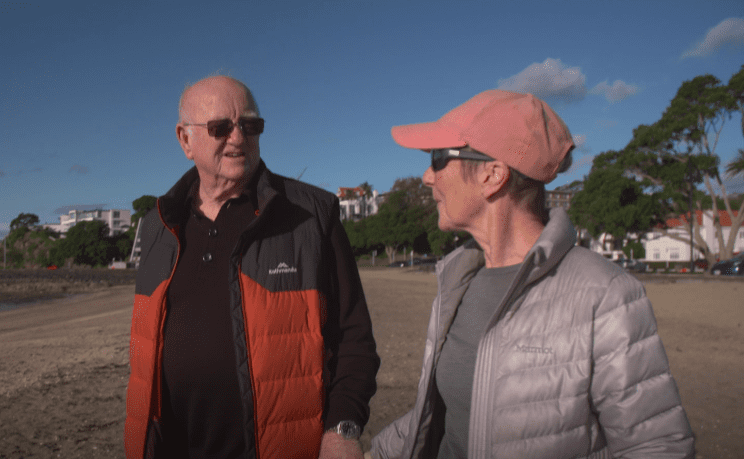Trending Stories
Research Reveals Alarming Ageism Against the Elderly within the Health Sector

Research Reveals Alarming Ageism Against the Elderly within the Health Sector
In a startling revelation, new health research has uncovered a distressing trend of ageism within the health sector, specifically targeted against the elderly.
The findings serve as a crucial warning about the future staffing crisis that the aged care sector might face.
With Te Whatu Ora projecting that 21% of New Zealand’s population will be aged 65 or over by 20s, urgent action is needed to address this issue and attract more nursing professionals to the field of aged care.
Associate Professor Samantha Heath, a leading nursing expert at Unitec in West Auckland, has shed light on the research outcomes, emphasizing the need for immediate intervention to combat ageism and promote inclusivity within healthcare.
Startling Figures and Implications
Associate Professor Samantha Heath’s soon-to-be-published research has exposed a disheartening statistic: 30% of trainee nurses surveyed across the nation expressed their reluctance to work in aged care.
Given that a quarter of New Zealand’s population is expected to be aged 65 and above within the next decade, this figure is particularly alarming.
Heath stresses the urgency of generating interest in nursing careers in aged care and eliminating the signs of ageism that were revealed through her research.
Her poignant statement highlights the need for students to be prepared and equipped to care for older adults in any setting they may encounter throughout their professional journey.
Restructuring Clinical Placements for Enhanced Learning
One of the significant revelations from the research is the importance of reevaluating the structure of clinical placements for nursing students.
Heath explains that an overreliance on aged residential care placements inadvertently undermines the valuable lessons that can be learned in other healthcare environments.
To combat ageism effectively, students must be exposed to diverse clinical settings where they can gain comprehensive experience in caring for older adults.
By diversifying their exposure and broadening their perspectives, students will be better equipped to meet the unique challenges and requirements of an aging population.
Unveiling Ageism in Local Attitudes
While ageism is a global issue that transcends beyond the health sector, the extent of ageist attitudes revealed in Heath’s research came as a surprise.
These findings underscore the pressing need for swift and effective implementation of measures to tackle ageism and prepare the healthcare workforce for the future.
By taking immediate action, it is possible to reduce ageism and cultivate a more inclusive and compassionate healthcare environment that values and respects older adults.
Preparing for the Demographic Shift
Te Whatu Ora Health NZ estimates that the current health budget allocates 46% of its resources to support people aged 65 and over. However, projections indicate that this percentage will rise to 54%. Furthermore, Te Whatu Ora’s population data forecasts that 21% of New Zealand’s population will be aged 65 and above.
To address the needs of an aging population, Te Whatu Ora is actively engaged in a comprehensive program that encompasses initiatives such as enhanced support for individuals living with dementia, rectifying pay disparities between residential aged care workers and hospital staff, and a thorough review of aged care support services.
Conclusion
The revelation of ageism within the health sector, particularly targeting the elderly, calls for urgent action to counter this discriminatory trend.
Associate Professor Samantha Heath’s research highlights the need to attract more nursing professionals to aged care and foster a more inclusive healthcare environment.
By restructuring clinical placements, diversifying experiences, and addressing ageist attitudes, the health sector can better prepare itself for the impending demographic shift.
The initiatives undertaken by Te Whatu Ora Health NZ signify a proactive approach toward supporting the aging population and ensuring a fair
Trending Stories
Sister Regina Liu: Empowering Health Through Acupuncture

Sister Regina Liu: Empowering Health Through Acupuncture
In the bustling world of healthcare, Sister Regina Liu stands out as a beacon of holistic healing. Her journey into the world of acupuncture is not only inspiring but also transformative for the countless individuals she has treated.
Through her dedication, Sister Regina has brought traditional Chinese medicine to the forefront, offering an alternative and complementary approach to modern medical practices.
The Journey of Sister Regina Liu
Sister Regina Liu’s path to becoming a renowned acupuncturist began with her deep-rooted interest in holistic health. Born into a family that valued traditional Chinese medicine, Sister Regina was exposed to the benefits of acupuncture from a young age. Her early fascination turned into a lifelong passion as she pursued formal education and training in the field.
Acupuncture: Bridging Ancient Wisdom and Modern Health
Acupuncture, a practice with origins in ancient China, involves inserting thin needles into specific points on the body to balance the flow of energy or “qi.” Sister Regina Liu has mastered this ancient art, using it to address a wide range of health issues.
From chronic pain to stress management, her expertise has provided relief to many who had exhausted conventional treatment options.
Impact on Community Health
Sister Regina’s impact extends beyond individual treatments. She has been instrumental in educating the community about the benefits of acupuncture, breaking down misconceptions, and making the practice more accessible.
Her workshops and seminars have enlightened many about the holistic approach to health, emphasizing the interconnectedness of body, mind, and spirit.
Success Stories and Testimonials
The success stories of Sister Regina’s patients are a testament to her skill and dedication. Many individuals who had lost hope found solace in her treatments.
For instance, Maria, a long-time sufferer of migraines, experienced significant relief after just a few sessions with Sister Regina. Her story is just one of many that highlight the transformative power of acupuncture under Sister Regina’s care.
Challenges and Triumphs
Like any journey, Sister Regina’s path was not without challenges. Integrating acupuncture into mainstream healthcare faced resistance initially.
However, her perseverance and the undeniable results of her treatments gradually won over skeptics. Today, Sister Regina is not only respected in the field of acupuncture but also in the broader medical community.
The Science Behind Acupuncture
While acupuncture is rooted in ancient practices, modern science has begun to unravel the mechanisms behind its effectiveness. Studies have shown that acupuncture can stimulate the release of endorphins, the body’s natural painkillers, and improve blood circulation.
These scientific validations have further cemented acupuncture’s place in contemporary healthcare, thanks in part to advocates like Sister Regina Liu.
Acupuncture in Modern Healthcare
Sister Regina’s work exemplifies how traditional practices can complement modern medicine. Hospitals and clinics increasingly incorporate acupuncture into their treatment plans, recognizing its benefits in pain management, mental health, and overall well-being. This integration signifies a broader acceptance and understanding of holistic health practices.
Future Vision
Looking ahead, Sister Regina Liu envisions a future where acupuncture and traditional Chinese medicine are fully integrated into the global healthcare system. She continues to advocate for research, education, and policy changes that support the inclusion of holistic practices in mainstream medicine.
How to Get Started with Acupuncture
For those new to acupuncture, Sister Regina offers practical advice on getting started. She recommends finding a certified acupuncturist, understanding the treatment process, and maintaining an open mind. Her guidance helps demystify acupuncture, making it more approachable for newcomers.
Conclusion
Sister Regina Liu’s journey in empowering health through acupuncture is a remarkable tale of dedication, resilience, and success. Her contributions have not only alleviated individual suffering but also enriched the broader understanding of holistic health. As acupuncture continues to gain recognition, Sister Regina’s legacy will undoubtedly inspire future generations of healers.
FAQs
1. What conditions can acupuncture treat?
Acupuncture can address various conditions, including chronic pain, migraines, stress, anxiety, digestive issues, and more. It is also used to support overall wellness and balance.
2. Is acupuncture safe?
Yes, when performed by a certified and experienced acupuncturist, acupuncture is safe. It involves using sterile, single-use needles and adhering to proper hygiene practices.
3. How many sessions are needed to see results?
The number of sessions varies depending on the condition and individual response. Some may experience relief after one session, while others may need multiple treatments.
4. Does acupuncture hurt?
Acupuncture needles are very thin, and most people feel minimal to no discomfort. Some may feel a slight tingling or warmth at the needle site.
5. How do I find a qualified acupuncturist?
Look for acupuncturists who are certified by recognized professional organizations and have positive patient reviews. Personal recommendations and consultations can also help in making an informed choice.
References
Trending Stories
In 2 Shape Gym Unveils Major Expansion in Stourport
Trending Stories
9 Reasons Why In-Person Friendships Are Irreplaceable
-

 Trending Stories1 year ago
Trending Stories1 year agoCDC: 1 in 4 Americans Still COVID-Free by End of 2022
-

 Health5 years ago
Health5 years agoMeghan Trainor Shares Motivational New Song ‘Blink’
-

 Health2 years ago
Health2 years agoHow Long Does Monkey Pox Last Before It Surfaces in the Body?
-

 Health2 years ago
Health2 years agoWhat Causes Swollen Body? Understanding Edema and its Triggers
-

 Health3 years ago
Health3 years agoNutrition and the Importance of a Fitness Program – 3 Things to Know
-

 Health3 years ago
Health3 years ago5 Weird Reasons Why Pimples Disappear After Marriage
-

 Health3 months ago
Health3 months agoHow Do Pawpaw Seeds Support Cardiovascular Health?
-

 Health2 years ago
Health2 years agoHealth Benefits Of Pawpaw Seed? 7 Things To Know







